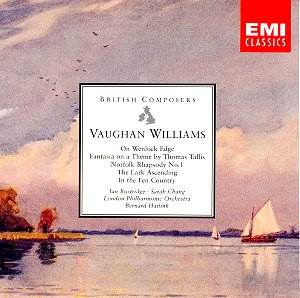A bit of a mixed bag,
this. Haitink kicks off with a fine
Tallis Fantasia, recorded in
1986. The pacing is good, as is the
sense of perspective between the various
tonal layers – first and second orchestras
and solo group. That’s followed by a
hauntingly autumnal Norfolk Rhapsody
no.1, its bitter-sweet quality caught
beautifully, and with considerable power
in the main climactic statements. I
found myself considering the impression
this music might have made on the young
George Butterworth, for there is a strong
resemblance to his Shropshire Lad,
in both the mood and the scoring of
the slower sections.
The Lark Ascending
is a different matter, unfortunately.
Sarah Chang, brilliantly talented though
she is, simply fails to capture the
elusive mood and character of this little
masterpiece. Her use of the bow is far
too heavy, resulting in a sound that
is too resonant and brilliant. I suspect
the violinists in the accompanying LPO
were cringing quietly – if only one
of them could have taken Chang on one
side and given her a few stylistic pointers!
As it is, this performance is a non-starter
in a very competitive field, with the
old Bean/Boult/LPO version still leading
the way.
Wonderful to have this
fine reading of the ‘symphonic impression’
In the Fen Country, a musical
image of the country around Cambridge,
where VW was, of course, an undergraduate.
As in the Norfolk Rhapsody, Haitink
moulds the music with sensitivity and
imagination, being careful never to
hurry it. Indeed, I am aware that some
find his approach too steady;
for my own part, I appreciate the way
he allows the music space to breathe,
so that all the lovely touches of harmony
and orchestration can register effectively.
But the highlight of
the disc for many will be Ian Bostridge’s
performance of six songs from On
Wenlock Edge. In the original version
of 1909, the voice is supported by piano
and string quartet. Here we have, however,
the later version VW made with orchestral
accompaniment. And very beautiful it
is, too, with, to take one example,
the opening of Bredon Hill rendered
breathtakingly evocative of the Shropshire
countryside, muted strings, horns, harp
and woodwind painting the picture.
Bostridge gives an
alert, intelligent reading. As you would
expect, it is vocally immaculate, with
some fine use of a darker colouring
than one is used to from his light,
limpid voice. Words are projected with
wondrous clarity – a model for all singers
– and there is an unstuffy, informal
approach which is very refreshing. Fine
though much of the rest of the disc
is, these songs, delivered by one of
the world’s finest lyric tenors, are
undoubtedly worth the price all on their
own. The recording is excellent, preserving
a perfectly natural balance between
Bostridge and orchestra.
Gwyn Parry-Jones
